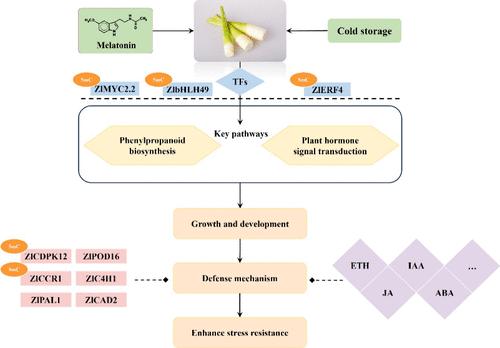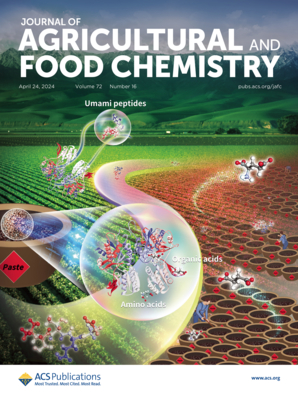褪黑激素通过促进冷藏条件下水竹笋的表观遗传学改变来减少木质素的生物合成
IF 6.2
1区 农林科学
Q1 AGRICULTURE, MULTIDISCIPLINARY
引用次数: 0
摘要
冷害和木质素沉积降低了水笋在冷藏过程中的市场价值。褪黑素(MT)的应用已被发现可以有效地减轻冷藏蔬菜和水果的冷害。因此,考虑到冷胁迫对水笋的重要性,我们研究了外源MT在冷藏条件下的影响。结果发现,外源MT增加了ZlCDPK12的表达,降低了苯丙素途径中ZlPOD16、ZlC4H、ZlPAL1、ZlCAD2和ZlCCR1等基因的表达。它延缓皮肤褐变和软化,减轻体重损失,维持总酚和类黄酮含量,同时减少木质素沉积。此外,苯丙烷代谢相关转录因子ZlERF4、ZlbHLH49和ZlMYC2.2的转录丰度与启动子DNA甲基化相关。总的来说,我们的研究提供了外源MT处理如何有效抑制水笋在冷藏过程中的变质的见解。此外,转录组和DNA甲基化数据的整合为未来通过基因工程进行改进奠定了基础。本文章由计算机程序翻译,如有差异,请以英文原文为准。

Melatonin Reduces Lignin Biosynthesis by Fostering Epigenetic Modifications in Water Bamboo Shoots under Cold Storage
Chilling injury and lignin deposition reduce the market value of water bamboo shoots (Zizania latifolia) during cold storage. Melatonin (MT) application has been found to be effective in mitigating chilling injury in cold-stored vegetables and fruits. Thus, considering the importance of chilling stress in water bamboo shoots, we have examined the impact of exogenous MT application under cold storage. It was found that exogenous MT increased the expression of ZlCDPK12 and decreased the expression of genes in the phenylpropanoid pathway, including ZlPOD16, ZlC4H, ZlPAL1, ZlCAD2, and ZlCCR1. It delayed skin browning and softening, reduced weight loss, and maintained total phenol and flavonoid contents while reducing lignin deposition. Moreover, the transcript abundance of phenylpropane metabolism-related transcription factors ZlERF4, ZlbHLH49, and ZlMYC2.2 is correlated with promoter DNA methylation. Overall, our study provides insights into how exogenous MT treatment effectively inhibits the deterioration of water bamboo shoots during cold storage. Furthermore, the integration of transcriptome and DNA methylation data lays a foundation for future improvements through genetic engineering.
求助全文
通过发布文献求助,成功后即可免费获取论文全文。
去求助
来源期刊
CiteScore
9.90
自引率
8.20%
发文量
1375
审稿时长
2.3 months
期刊介绍:
The Journal of Agricultural and Food Chemistry publishes high-quality, cutting edge original research representing complete studies and research advances dealing with the chemistry and biochemistry of agriculture and food. The Journal also encourages papers with chemistry and/or biochemistry as a major component combined with biological/sensory/nutritional/toxicological evaluation related to agriculture and/or food.

 求助内容:
求助内容: 应助结果提醒方式:
应助结果提醒方式:


